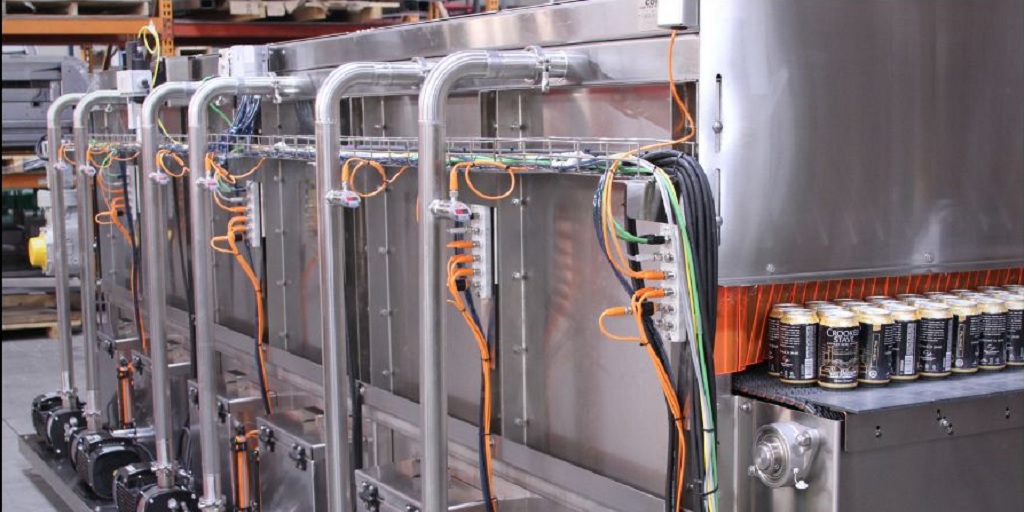
US firm Codi launches compact pasteuriser

US firm Codi Manufacturing has this month launched a compact pasteuriser for use in smaller breweries.
The Codi tunnel pasteuriser has a compact design which the company says is one of the smallest footprints in the craft beverage space.
Pasteurisation, the process of heating beer to inhibit the growth of microorganisms which can contribute to beer spoilage, has been the subject of much discussion in Australia.
The argument has been revisited recently with the growth of no- and low-alcohol beers, which often need to undergo the process to ensure shelf stability.
Andrew Ferguson, sales manager at Colorado-based Codi, said that despite the craft beer explosion in the US in the past 10 years, there has not been a focus on pasteurisation until recently.
“Although restaurants and bars are slowly making a comeback, the packaging mix in the US craft market has dramatically moved towards cans and bottles versus kegs.
“Breweries who relied on keg and pint sales needed to scramble to get into packaging. This dramatic shift in packaging is related to COVID [but] it will have a long term impact as well.
“These lessons will not be forgotten anytime soon and most craft beverage manufacturers will always plan on cans to have a larger role in their portfolio moving forward.”
This is where pasteurisation comes in.
“Most breweries are selling local and very few are capable of exporting,” he said.
“The first priority of improving shelf stability in packaging is to focus on dissolved oxygen.
“This has been the focus of many craft brewers around the world, and pasteurisation takes this process a step further.”
The pasteuriser
Codi has moved into the Australian market and has sold several dozen fillers in the country with another six in production for installation, working with Chris Kelly from East Coast Canning who installs and services Codi equipment.
There are no Codi pasteurisers in Australia just yet, but with the rise of packaged beverages and lower-alcohol beers we may see more in future.
Ferguson said that the Codi pasteuriser uses proven technology used by other beverage producers.
“[It also uses] technology trusted by the largest breweries in the world being brought down in cost and speed to apply to the craft market,” he explained.
There is no limit to the size of the brewery able to use the pasteuriser, but Ferguson said it was a factor of volume and reach.
“How far do you want your product to travel and under what conditions? If you can sell everything within an hour of your brewery and everything is cold stored, then you have no need for this,” he said.
Ferguson said that price and size are always a concern. He acknowledged that despite their relatively compact size, they are not small units and may not be ideal for breweries with limited space.
Importance of pasteurisation
Ferguson explained that pasteurisation is much more common in Europe because the liquid often travels further, and it could be required by law or as part of longer shelf stability requirements. In the US, pasteurisation is not required except for imported beer, he said.
In Australia, while it is not required by law, bottleshops and retailers like BWS and Dan Murphy’s say pasteurisation is highly recommended to ensure shelf stability,. If not, they require brewers to invest in other quality assurance practices.
“Pasteurising the can is the best way to ensure everything touching the product is sterilized. If you only concentrate on the liquid then you miss the potential areas of bacteria pickup that exist through packaging,” Ferguson said.
When deciding on methods of pasteurising, brewers are spoiled for choice – if they can afford it – with batch, flash and tunnel pasteurisation on offer, all with their advantages and disadvantages.
But tunnel pasteurisation is Codi’s preferred method because of its automation, consistency and “approachable pricing” according to Ferguson.
“We index the cans from a single lane conveyor and spread them out over a large conveyor at slow speeds that will allow the cans to travel through 7 specific temperature zones.
“This allows the cans to reach the desired pasteurisation temperature, hold the temperature for a specific amount of time and safely bring the product temperature back down before the exit.
“We also focus a lot of attention on energy efficiency by transferring the water from zone to zone in a pattern.”
The question of taste
One of the major concerns with pasteurisation is how it affects the flavour and aroma of beer, and to what extent it accelerates staling.
“I have done plenty of tasting of beers in Germany and the same beer in the states. Or of beers in Belgium versus the same beer in Australia.
“You could argue the change in flavour is due to pasteurisation but it isn’t that easy,” Ferguson said.
“They are also transported long distances and could be on the top container on a boat travelling over the equator where they will almost get boiled. So the factors of pasteurisation affecting flavour profile are hard to judge in isolation.”



